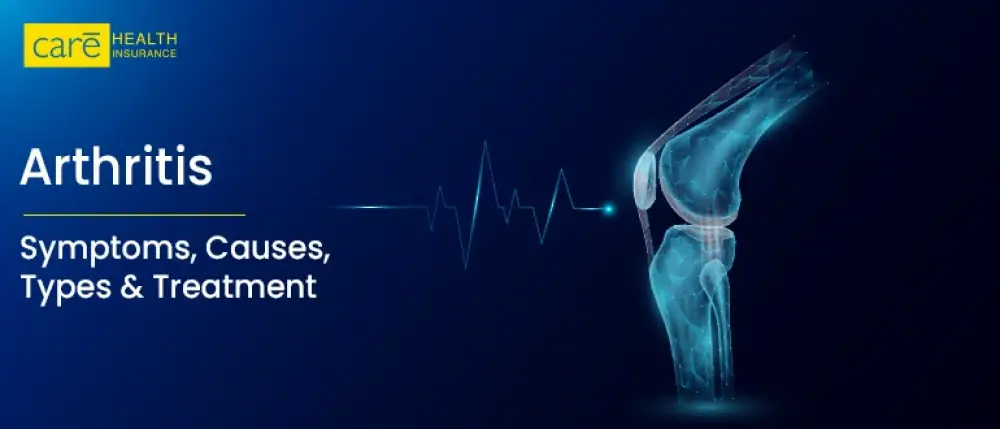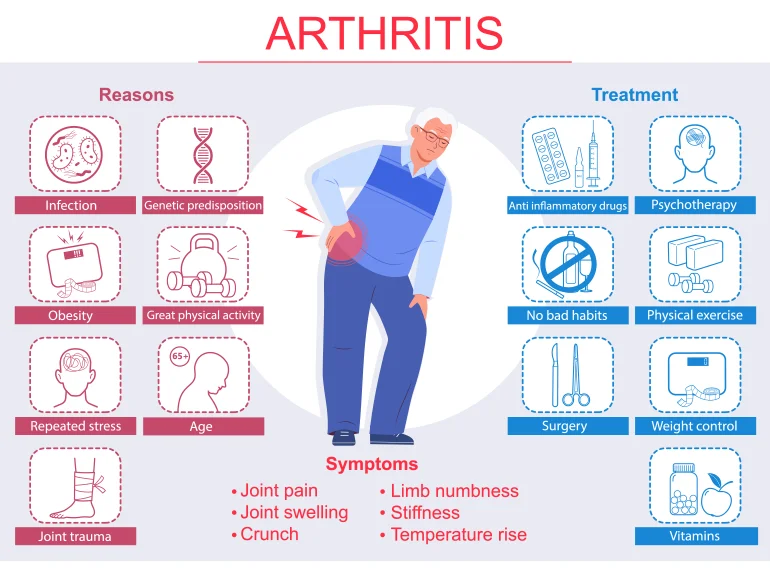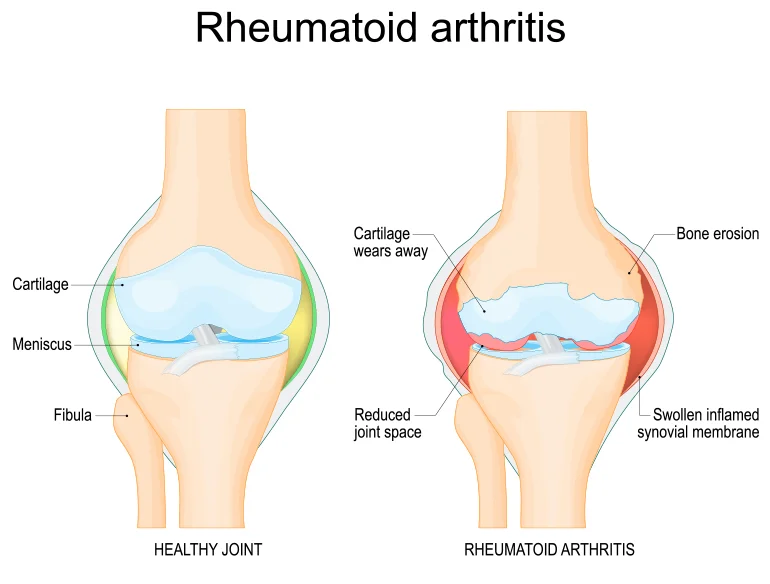Subscribe to get weekly insights
Always stay up to date with our newest articles sent direct to your inbox
Published on 20 Nov, 2024
Updated on 12 Dec, 2024
1106 Views
5 min Read

Written by Mudit Handa
favorite0Like
favoriteBe the First to Like
Life is easier when your body remains flexible. However, if you face any stiffness in joints, it seriously affects your body’s movement. Such a situation hugely impacts your daily life functions and makes you feel helpless. Many diseases affect joint flexibility and mobility. One such common illness is arthritis. Numerous people of various ages suffer from painful joints due to arthritis.
A renowned rheumatologist, Dr Shrikant Wagh, has said that arthritis affects more than 210 million people in India, constituting about 15% of the entire population. Moreover, the prevalence of this disease is growing higher than many other diseases, such as diabetes, HIV, and cancer.
This article will explain the causes and symptoms of arthritis and how to treat this disease so you can live free of pain and worry.
Arthritis is a broad term encompassing various conditions that affect the joints, causing pain, stiffness, and inflammation. It can significantly impact mobility and quality of life. Understanding the symptoms, causes, and different types of arthritis is crucial for early diagnosis and effective management.
Here are some of the most common symptoms of arthritis that most patients face:

Here are different types of Arthritis based on the region of the body where they occur:
Osteoarthritis: The most prevalent form, characterised by cartilage degeneration.
Degenerative osteoarthritis, commonly known as osteoarthritis, is primarily caused by the gradual wear and tear of cartilage in the joints. This wear and tear is generally worsened in the elderly age due to the following factors:
Rheumatoid arthritis commonly occurs with the presence of the following symptoms:

In addition to these common symptoms, rheumatoid arthritis can also cause other issues like:
If you or someone you know is experiencing these symptoms, you must see a doctor for evaluation and diagnosis. Early diagnosis and treatment can help slow the progression of rheumatoid arthritis and prevent joint damage.
Here are some evident causes of various forms of arthritis:
Early diagnosis and appropriate treatment are essential for managing arthritis effectively and minimising joint damage. Accordingly, treatment options may include:
Arthritis treatment aims to reduce pain, improve joint function, and slow disease progression. The specific treatment plan will vary depending on the type of arthritis and the individual's symptoms. Accordingly, the following treatment approaches can help treat arthritis:
There are two types of therapies which are ideal for treating arthritis:
These are the standard rheumatoid arthritis therapies that are generally prescribed for effective rheumatoid arthritis treatment.
Here are some effective lifestyle changes that can help you manage and cure arthritis:
These are some healthy habits that can help you manage arthritis pain and prevent the necessity of surgery.
Yet, there are some severe cases where joint replacement surgery is necessary. This can take up a considerable chunk of your savings for hospitalisation expenses such as ICU charges, surgery, consumable expenses, and medications.
>>Read More:Acute Kidney Injury: Causes, Symptoms and Treatment
In today’s age of inflation, covering medical expenses from savings seems next to impossible. Suppose a health emergency arises that requires urgent surgery; the treatment of the disease can take up a significant portion of your savings. The only way to stay stress-free is to have adequate health coverage. It is always wise to prearrange adequate health coverage for certain slow-growing diseases such as arthritis. However, most health insurance policies usually have a waiting period for such conditions. This is a waiting period before you can make claims related to the condition. You can also buy health insurance policies, in which you can also opt for a waiting period modification feature for slow-growing diseases like arthritis to reduce your waiting period.
Take control of your health and well-being today! Secure health coverage for yourself and your family to ensure a stress-free future.
Disclaimer: Verifying the policy details and coverage with the official policy documents is essential. Also, kindly consult a professional medical expert to verify the details of health concerns.
favoriteBe the First to Like
Thyroid : मामूली नहीं हैं महिलाओं में थायराइड होना, जानें इसके लक्षण और घरेलू उपचार Vipul Tiwary in Diseases
शुगर कंट्रोल कैसे करे? जानें, डायबिटीज में क्या खाना चाहिए Vipul Tiwary in Health & Wellness
हाई ब्लड प्रेशर को तुरंत कंट्रोल कैसे करें? देखें इसके उपाय Vipul Tiwary in Diseases
पैरों में दर्द किस कमी से होता है? जानें, इसके घरेलू इलाज Vipul Tiwary in Health Insurance Articles
Smog Season is Back: Are You Really Safe? Sejal Singhania in Health Insurance Articles
Amino Acids: The Unsung Heroes of Your Mental Well-being Jagriti Chakraborty in Mental Health
8 Reasons to Start Your Morning with Ajwain Water Jagriti Chakraborty in Home Remedies
Ice Water Face Dip: The 15-Second Beauty Hacks Celebs Swear By Jagriti Chakraborty in Home Remedies
Always stay up to date with our newest articles sent direct to your inbox
Loading...